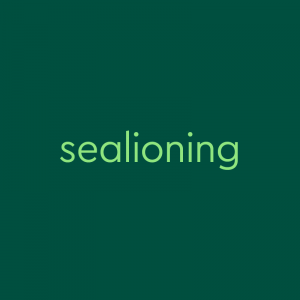Slang dictionary
sealioning
[ see-lahy-uhn-ing ]
What does sealioning mean?
Sealioning is a critical term for a form of trolling that involves relentlessly pestering someone with questions and requests (such as for evidence or sources), typically with the goal of upsetting them and making their position or viewpoint seem weak or unreasonable.
The verb form sealion (or sea lion) is also used.
These terms are typically applied to online contexts, such as social media, forums, and message boards (although it can also happen offline).
Sealioning often involves giving off the impression of sincere curiosity and an open mind, using polite-sounding language, and framing the questioning as part of honest intellectual debate. However, the real goal of such behavior is to irritate the other person until that person gets angry or upset, thus allowing the questioner to portray themselves as a victim as an attempt to diminish a position or viewpoint they disagree with.
Here’s a hypothetical example of behavior considered sealioning: A person replies to a post about climate change by repeatedly and incessantly requesting that the poster prove basic scientific concepts. Regardless of whether the poster responds, the replier relentlessly continues to pose additional questions, possibly even doing so on other social media platforms. The replier typically does not stop until they are blocked or it is clear that they have upset their target.
Example: Scientists with prominent social media presences know that sealioning is a very common way for trolls to try to fluster them and waste their time.
Where does sealioning come from?

The term and concept of sealioning was popularized by the 2014 webcomic “The Terrible Sea Lion” by artist David Malki. In the comic, a person states in a private conversation that they dislike sea lions. In response, a sea lion suddenly appears and relentlessly harasses the person by asking them to provide evidence that supports their negative opinion of sea lions. The sea lion pretends to be nice and reasonable while still following the person to their home and continuing to harass them, even when they are trying to sleep. When the person gets upset and asks the sea lion to leave, the sea lion claims they have done nothing to deserve such rudeness. Malki has explained that the sea lion in the comic was intended to represent certain types of behavior.
The term is now most commonly used to call out such behavior on social media, where it’s considered a specific type of trolling.
I blocked some dude because I didn't feel like debating his sealioning ass. He looks me up and sends me an email to continue the debate
— S.I. Rosenbaum (@sirosenbaum) November 4, 2014
Examples of sealioning
Who uses sealioning?
Sealioning is always used critically to refer to what’s considered a form of trolling. It’s usually applied to online contexts.
Every time some troll with two followers comes into my mentions wearing his best sealioning “debate me” hat and no one responds to him at all, I set aside $10 towards a new pair of Fluevogs.
— Eva (@evacide) November 10, 2021
This person thinks that ~6 people tweeting at them for being a sealioning ass is the worst thing in the world.
— Randi Lee Harper (@randileeharper) February 19, 2015
Folks who "engage" an issue by sealioning & then assume no one's working on that issue anymore b/c folks they sealioned ignore them.
🐸🍜— Dr. Janet D. Stemwedel, PhD 🏳️🌈 (@docfreeride) January 30, 2016
Note
This is not meant to be a formal definition of sealioning like most terms we define on Dictionary.com, but is rather an informal word summary that hopefully touches upon the key aspects of the meaning and usage of sealioning that will help our users expand their word mastery.